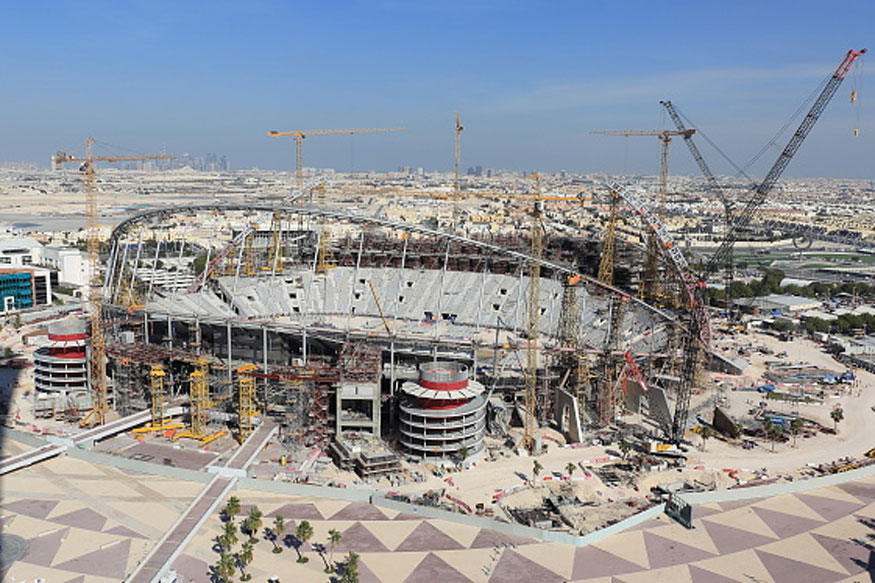Football is a cherished international institution followed by millions of fans around the world. Every several years, countries come together and vote to decide the location of the FIFA World Cup tournament. During the 2018 World Cup in Russia, around 900 million viewers are estimated to have watched the final France vs Croatia match. Excitement was high and now the world looks ahead to 2022 in anticipation for the next World Cup. Qatar was selected to host the next iteration of the “beautiful game;” however, a specter looms over the next competition due to concerns about dishonesty, sabotage, and widespread human rights abuses.
During the FIFA 2010 voting process, Qatar became the first Arab host of the World Cup, winning the right to host the 2022 World Cup. Normally this would be an occasion to celebrate. The World Cup celebrates diversity and is a global event that brings people together. However, a recent report in the Sunday Times, as detailed in Vice News, casts doubt on this celebration of diversity, stating that Qatar launched a “black ops” campaign to sabotage its fellow contenders for the 2022 World Cup, making a mockery of the ostensibly good faith process of selecting a World Cup host.
While Qatar’s Supreme Committee for Delivery and Legacy (the body responsible for overseeing all construction and infrastructure projects for the 2022 FIFA World Cup) rejects the allegations, the United Kingdom’s Chairman of Digital, Culture, Media and Sport select committee, Damian Collins, has called for an independent investigation. The accusations against Qatar describe a wide-ranging smear campaign that includes: paying a respected US academic USD 9,000 to write a negative report about the economic cost of holding the World Cup in the United States, and recruiting journalists from each bidding country to speak out against hosting the World Cup. They also include recruiting American physical education teachers to ask their US Congressmen to fund high school sports instead of the World Cup, organizing protests in Australia, and developing intelligence reports on individuals involved in their countries’ bids. The claims stem from a leaked document that describes the involvement of a US PR firm and ex-CIA agent.
While some have already called for Qatar to be stripped of the World Cup, the verdict has not been decided. An investigation is underway concerning the allegations and, if found guilty, Qatar may face sanctions or even be stripped of the event. Ultimately while Qatar may be found guilty, it seems unlikely it will be stripped of the event considering the billions of dollars the government has already spent to prepare for the event. However, another specter also looms over the 2022 games: the kafala system of labor sponsorship. Kafala is a system for managing migrant labor wherein workers are placed under the direct control of the businesses that employ them. But since the Government of Qatar provides no meaningful protection for these workers, their employers often abuse them and take advantage of them. Over the years such abuses have included slum-like living conditions, withholding of wages, threats of imprisonment by revoking visas, forced labor, physical and sexual abuse, and human and sex trafficking.
While workers around the Gulf Cooperation Council (Saudi Arabia, Bahrain, Kuwait, Oman, the United Arab Emirates, and Qatar) face these conditions, the decision to have Qatar host the World Cup has drawn considerable attention due to labor abuses. Migrant laborers are recruited through recruitment agencies that target countries that struggle with poverty and unemployment, including South Asian states like Nepal, Bangladesh, and India. Amnesty International, which has reported extensively on this topic, has outlined many of the wide ranging abuses workers have been subjected to during the construction of the 2022 stadium. The abuses include recruitment fees that place workers in debt, cramped, dirty and unsafe living conditions, false promises of salaries that lure workers only to pay them less than advertised, delayed salary payments that leave workers unable to purchase food, the withholding of residency permits and refusal to renew residency permits, leaving workers trapped in their jobs and work camps, confiscation of passports leaving workers unable to leave Qatar until their contract is finished despite abuses, verbal threats from employers, and threats of deportation or wages reduction for workers who refuse to labor or live under such poor conditions. As a result, workers are forced to stay in an abusive environment with no way to leave and with the looming threat of losing wages if they attempt to address their situation.
Qatar’s 2022 World Cup is being built on corruption and widespread concerns about labor and human rights abuses. Such practices demean and corrupt the “beautiful game” beloved by millions. FIFA must strongly and seriously address these concerns, in particular concerns about systematic labor abuses stemming from the kafala system, even if such steps mean the revocation of Qatar’s privilege of hosting the World Cup.
Chris Campbell is an Advocacy Intern at ADHRB





